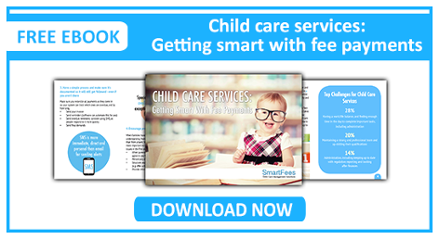Avoiding late payments and bad debt in the first place is far better than getting stuck in a difficult situation. Creating a culture of prompt payment at your child care service will help avoid some of the issues. Bear in mind that you may be one of the lowest priorities for a family struggling financially, despite the important role you play in their life. After all, how can they go to work and earn an income if they don’t have child care? But the reality is that families tend to expect more time and understanding from a business such as a child care provider than from a bank or electricity provider.

Have a clear policy
If you were to ask the parents at your day care centre what your payments policy is, would they know? Do you even have a payments policy? If not, that’s the first thing to set up.
Include it in a welcome pack for the parents when a new child starts, and be upfront and honest. Have them sign the policy as part of their contract on joining.
Publicise your policy
People forget. People claim they forgot. So keep your payment policy visible by periodically distributing it or promoting it. There’s nothing wrong with a gentle nudge in a newsletter that "we do remind parents that fees are due by the end of the month. Please find enclosed a copy of our payments policy". Parents that are paying on time won’t mind seeing this, and those that are slow payers may realise their tardiness has been noticed.
If you have a website, put the payments policy on there as a clear link, from the front page even: "Fees and Payments Policy". The more professional and organised you appear when it comes to your finances, the more you’ll attract the right kinds of families. Those looking for a "soft touch" when it comes to payment may be deterred.
Set up direct debit
Encourage parents to enter into an automatic payments/direct debit program. People are becoming increasingly used to direct debit to pay for utility bills and other services, as it’s effortless on their part.
Also set your fee structure to encourage direct debit. For example, offer a "discount" on payment by direct debit (in effect, a five or ten per cent surcharge on those paying by other methods). You could also be a centre that only accepts direct debit, no other methods of payment. In an area of high demand and undersupply for childcare, most parents won’t be put off by such a policy, as they are so desperate for places.
Getting and staying ahead
Consider charging an 'enrolment bond' to minimise your exposure to late payers. Do be aware that money comes with 'strings attached' though. You will have to redeem the bond at a future date. Consider making the bond you require less if the parent chooses direct debit.
Address slow payment early
The first time a parent becomes a slow payer, don’t let it slide. They may take that as a green light that it’s okay to be late, that it doesn’t really affect you if they’re a few weeks late paying bills. Consider introducing a policy for repeatedly slow payers ("repeat" could be defined as three late payments) that they need to enter a direct debit agreement or their child needs to leave.
Provide information about assistance
There is Child Care fee assistance available from the government. Special Child Care Benefit may be available for a family "with an exceptional case of short term financial hardship which has substantially reduced their capacity to pay child care fees."
Finally, it’s good to remind parents how important their fees are in terms of benefitting their children. Publicise what extra investments you are able to make: training courses to improve the skills and qualifications of day care staff, new and safe play equipment that encourages physical fitness and agility, more books and educational resources to enhance pre-schoolers’ readiness for primary school.
By doing this, you are linking the fees directly to the benefits that their children are getting through your child care service. You can also have future goals so they know what their continued payments are going towards.
For more tips on how to stay on top of your finances, download our free ebook ‘Child care services: Getting smart with fee payments’ by clicking the button below.



